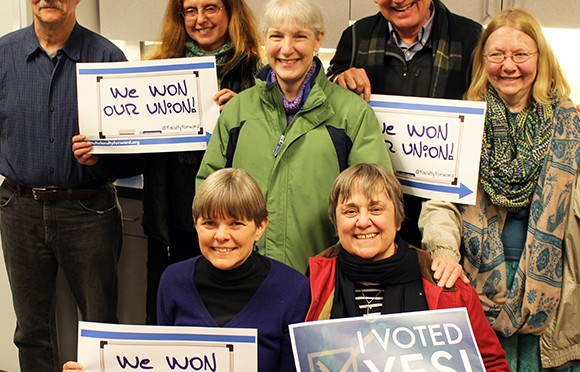On December 11, 2014, tenured and tenure-track faculty members of the Tufts University School of Medicine (TUSM) filed a petition to the National Labor Relations Board (NLRB) to hold on-campus union elections. If this election is allowed by NLRB, then the 70 members of the TUSM faculty will join the ranks of their Medford colleagues in the Faculty Forward union at Tufts, a division of the Service Employees’ International Union (SEIU) Local 509 (1). As mentioned, this is not the first time Tufts-affiliated faculty have filed for unionizing. In February 2015, majority of the Medford/Somerville campus faculty had voted in favor of unionizing in an effort to improve working conditions (2). And even before that in 2014, adjunct faculty members on the Medford campus, rallying under the Adjunct Action division of SEIU, negotiated a significant raise in their pay (3) that is set to be completely in effect by September 2016 (4).

The TUSM faculty appears to be motivated for similar reasons; in a joint email to Tufts Daily, Dr. Karina Meiri, Professor of Developmental, Chemical & Molecular Biology (DMCB), and Dr. Henry Wortis, Professor of Integrated Physiology & Pathobiology (IPP), mentioned issues regarding salary and research funding as major sources of motivation. They elaborated in the letter that while faculty members are trying to get funding in an increasingly competitive environment with diminishing sources, the university is putting on additional pressure on them by providing “negative incentives”. Drs. Meiri and Wortis mentioned, “If faculty were unsuccessful, [in their application] as they were pretty much bound to be, given the odds, their salaries would immediately be cut, often by very significant amounts.” They also pointed out that many faculty felt that their ability to speak their minds on administrative decisions was being limited. Drs. Meiri and Wortis believe that through unionization, financial transparency and partial restoration of decision-making ability, job security and stability can be achieved for the faculty. To quote, “Our strong belief is that the educators and researchers at a university need to be deeply involved in decisions that shape its mission and that unionization will provide a path towards…the return of collegiality”. It seems that majority of the TUSM faculty are in favor of unionizing, as almost 60% of them had voted in favor of holding on-campus elections. The ones who did not vote, either did not do so because they do not want a union or they do not feel strongly enough for the need of one, as Drs. Meiri & Wortis explained in their letter.
Faculty unions are not new in this part of the country – if the TUSM faculty are allowed to hold elections on campus, they will join their colleagues at Northeastern, BU, Lesley and Bentley Universities (5). There is also an increasing trend of faculty unionization throughout the country, and Drs. Meiri & Wortis believe it to be a reactionary movement to the increasing adaption of a for-profit model by universities. They explained in their letter, “Many universities have chosen to save money by shifting the burden of teaching to part-time untenured…adjunct faculty members. Others have increased the cost of enrollment to plug financial holes. University priorities are increasingly being set by financial rather than academic agenda. Across the country whenever universities are being managed as corporations rather than collegial institutions faculty are increasingly looking towards unionization as a means to re-assert the original model of shared decision-making.”
While it may seem reasonable to allow tenured and tenure-track faculty to unionize, it is not the case. The legal precedent set by the 1980 ruling in the NLRB v. Yeshiva University, which found the tenured faculty not eligible for unionization for their significant influence on administrative decisions, stacks the odds against the TUSM faculty’s hopes of holding on-campus elections. This precedent is also partially responsible for the opposition of the TUSM administration to the faculty’s petition at the NLRB. As the Executive Director of Public Relations, Kim Thurler, told Tufts Daily “that 1980 Supreme Court ruling … recognizes the substantial authority faculty members hold and their significant voice in determining curriculum, academic standards and policies. Many NLRB decisions since 1980 have followed this Supreme Court precedent.” (1)
Currently, the TUSM faculty waits on the NLRB’s decision on whether they will be allowed to hold elections or not. Regardless of this decision, the fact that this has become a trend across universities, institutions founded on principles of non-profit due to their increasing profiteering nature, is a great cause of concern indeed.
Drs. Meiri & Wortis’ quotes have been reproduced from their letter to Tufts Daily with their permission. The Tufts Daily article was published on Jan 29, 2016, and can be found here.

